Nach
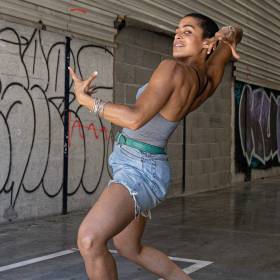
- Le Beau Bizarre” podcast by Zineb Soulaimani – 2022
- Nach in “Entrez dans la danse” on RCF radio station – 2023
Bio –
Born in 1987 in Montreuil, France, Nach discovered krump aged 22 outside the Lyon Opera House, after seeing Rize, David Lachapelle’s documentary about this urban dance style. In parallel, Nach developed her relationship with the stage and the creative process. As a performer for various artists, she collaborated with personalities from all backgrounds, such as choreographer Heddy Maalem and stage director Marcel Bozonnet; and, on the musical side of things, Koki Nakano and Winter Family’s Ruth Rosenthal. In the cinema sphere, she went on a singular adventure with students from one of the Kourtrajmé collective’s schools: a piece of work about transmission, focusing on the body, posture and embodiment – foundational aspects of her own pathway. 2017 marked a step change, with the making of her first solo, Cellule, followed in 2019 by Beloved Shadows, created after a stay in Japan, where her discoveries included performing arts such as Noh theatre and bunraku, as well as butoh dance. Now more convinced than ever of the need to tell important stories, Nach began to more purposefully follow her own path – that of an organic body, whose powerful yet delicate dance interplays with other artistic perceptions and gestures such as the visual arts; spaces for wandering and shifting; words and light. This creative approach was reflected in her danced lecture Nulle part est un endroit (2021). Her work is hard to categorise, equally interrogating femaleness and the processes we each undertake to reappropriate a multiple identity – issues that she addressed differently in her first group piece, Elles disent (2022).
François Chaignaud
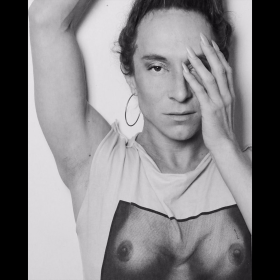
- “Tous danseurs” podcast by Dorothée de Cabissole – 2022
- “La Quatre saisons n'est pas qu'une pizza" podcast on Radio France Musique”
Bio –
Born in 1983 in Rennes, France, François Chaignaud graduated in 2003 from the national music and dance conservatoire (CNSMD) in Paris. He has worked with numerous choreographers including Alain Buffard, Boris Charmatz, Emmanuelle Huynh and Gilles Jobin. Since creating his first piece in 2004, he has pursued a multi-faceted career as a dancer, choreographer, singer, actor, historian and cabaret artist. His work weaves for dance the dream of a holistic form of expression that explores bodies’ porosity and potential, and an early feature of it was the connection between singing and dance (Думи мої). A history graduate, he informs his art with in-depth research – and this historical substance is reflected in both his own works and the many collaborations he is constantly engaged in, most notably with cabaret artist Jérôme Marin (Sous l’ombrelle), Marie Caroline Hominal (Duchesses), and the visual artist Théo Mercier (Radio Vinci Park). From 2005 to 2016, François Chaignaud created with Cecilia Bengolea several notable pieces that were staged worldwide, including Pâquerettes (2005), Sylphides (2009), (M)IMOSA (jointly written and performed with Trajal Harrell and Marlene Monteiro Freitas, 2011), Dub Love (2013) and DFS (2016). In 2021 he set up Mandorle Productions, further affirming his wish to continue an artistic approach featuring numerous collaborations. With Nino Laisné he created Romances inciertos, un autre Orlando (2017), a song and dance show based on androgynous figures in Spanish Baroque folklore, which was performed at the 72nd Avignon Festival; together they are carrying out fresh research into South American partner dances. In May 2018 he created Soufflette, a piece for Carte Blanche, Norway’s national contemporary dance company. May 2019 saw the premiere, at the Kunstenfestivaldesarts, of Symphonia Harmoniæ Cælesitum Revelationum, a exploration into the repertoire of Hildegarde de Bingen in collaboration with Marie-Pierre Brébant. In 2021, François Chaignaud created Golden shower, a duet in which he danced alongside Japanese octogenarian Akaji Maro. In 2022, he created Tumulus for the Avignon Festival with Geoffroy Jourdain, director of vocal and instrumental ensemble Les Cris de Paris.
Collectif ÈS

Bio –
Now in their thirties, Sidonie Duret, Jérémy Martinez and Emilie Szikora met in 2009 at the national music and dance conservatoire (CNSMD) in Lyon, where they experimented with creation and performance in P’Lay’s, a piece for three dancers and a crisp-eater. This trio gave rise to Collectif ÈS in 2011. In 2014, their second piece, Hippopotomonstrosesquippedaliophobie, won the Prix du Public at the 6th Concours Reconnaissance. What they enjoy most is rummaging, searching and exploring to make three-handed choreographic compositions. Collectif ÈS approaches the creative process as a collective endeavour, making objects that flow from the group. Through concrete actions and intentions, the three choreographers seek a physical intensity that drives bodies to commit and be fully inhabited; and a desire to develop a physical empathy, to be invested in bodies that convey and exude the pleasure of being together. This research is constantly informed by their interrogations of communication, of group energy, of their need to operate in this way, and of the social role their cast can play. Creating is an opportunity to come together and strive together, to examine their relationships with others. They try to understand and emphasise the question of intimacy and commonality, in passing from one to the other. This informs each of their pieces: Hippopotomonstrosesquippedaliophobie (2014); Jean-Yves, Patrick et Corinne (2017), a trio for five; 1ère MONDIALE (2019), some group solos; and Fiasco (2021). La Série Populaire, initiated in 2016 with I wanna dance with somebody, revisits the customs of popular practices and gatherings, and brings the collective – in the broad sense – into play in pieces with hybrid, participatory forms that engage audiences. Next came Le Karaodance (2018) and Loto3000 (2020). As associate artists at La Rampe in Echirolles (2019-2022), they created the YOLO practice-swap concept as well as J’peux pas j’ai Bingo ! and Mini Mode d’Emploi à Danser for children. Since 2022, Collectif ÈS have been associate artists at the National Choreography Centre (CCN) of La Rochelle Mille Plateaux, and at Rive Gauche in Saint-Etienne-du-Rouvray.
Phia Ménard
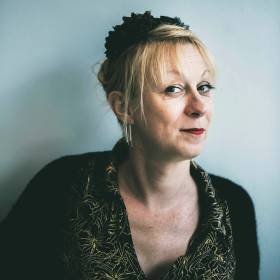
- “Affaires culturelles” podcast by France Culture – 2021
- “Rencontres augmentées” podcast by Scène Nationale du Sud-Aquitain – 2020
- “En tête à tête” podcast by Théâtre National de Bretagne – 2022
Bio –
Born in 1971, Phia Ménard trained in contemporary dance, mime and acting, and in particular studied juggling with Jérôme Thomas. In parallel, in 1997, she attended a course on dance practice. She founded Compagnie Non Nova with Claire Massonnet in 1998, its founding precept being: ”we invent nothing, we see it differently: Non nova, sed nove”. She came to attention as a choreographer with the solo Ascenseur (2001). She spent three seasons as an associate artist at the scène nationale Le Carré in Château-Gontier; with her own team and that of the host theatre, she developed stage work where juggling’s spectacular image was challenged in favour of a new relationship with the audience. This period gave rise to several new pieces and events such as Zapptime, rêve éveillé d'un zappeur; the performance lecture Jongleur pas confondre with sociologist Jean-Michel Guy; and the “Hors-Pistes” series including Est-il vraiment sérieux de jongler ? In 2005 and 2007, she developed work around the idea of “unjuggleability” and created two pieces (Zapptime#Remix and Doggy Bag) and two cabaret shows, Jules for ever and Touch It with the Frasques music sextet. In 2008, her artistic pathway took a fresh direction with the I.C.E. project (standing for “complementary unjuggleability of the elements”), which aimed to study imaginaries of transformation and erosion through natural materials. That same year, at Les Nouvelles Subsistances in Lyon, she created P.P.P., the first part of the Pièces de Glace cycle; and created the performance L’après-midi d’un foehn Version 1, the first in the Pièces du Vent series, at the Natural History Museum in Nantes. In 2009, she collaborated on Coyote Pizza, a project by the La Valise collective, staging the performance Iceman. In 2010, the 64th Avignon Festival and the SACD invited her to the Sujets à Vif sidebar: with sound poet Anne-James Chaton she created the performance Black Monodie, the second opus in the Pièces de Glace series. In October 2011, two further Pièces du Vent works were premiered: L’après-midi d’un foehn and VORTEX. Menard initiated In the Mood, a project on questions of gender and humour in Brussels at CIFAS (international centre for performing arts training) with philosopher Paul B. Preciado. In June 2015 she premiered Belle d’Hier at the Montpellier Danse festival. In 2017, she premiered Contes Immoraux - Partie 1 : Maison Mère and Les Os Noirs. In 2018, she devised and staged Et in Arcadia Ego, an opera based on the music of Jean-Philippe Rameau, for the Opéra-Comique in Paris. She premiered Saison Sèche, a piece about violence against women co-written with Jean-Luc Beaujault, at the 2018 Avignon Festival. That year, she also devised No Way, a performance piece to celebrate the 70th anniversary of the Universal Declaration of Human Rights. She also gave a talk at Unesco’s Art Lab for Human Rights and Dialog on 11 December. In 2019, she received the Prix Topor/SACD award for “the unexpected” for La vie dans tous les sens, and the Grand Prix du Jury at the 2019 Belgrade International Theater Festival. In 2020, she created the piece Fiction/Friction with year X drama students from the Théâtre National de Bretagne; and the final-year show by the 79th intake of drama students at ENSATT in Lyon, with the title “Democracy: how amusing”. In 2020, the French arts critics body awarded Phia Ménard the Prix de la Critique (dance/performance category). In 2021, she performed in Régine Chopinot’s A D-N and, in parallel, created La Trilogie des Contes Immoraux (pour Europe), which was staged at the Avignon Festival. The following year, she directed Les enfants terribles, adapted from Jean Cocteau’s play, at the Opéra de Rennes.
Marco Da Silva Ferreira
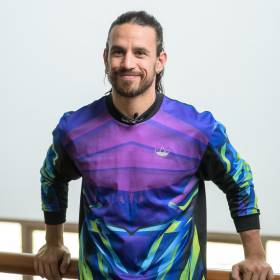
- “Minute du spectateur” by Maison de la danse de Lyon – 2022
- Podcast by Fédération des Radios Associatives en Pays de la Loire
Bio –
Born in 1986 in Santa Maria da Feira, Portugal, Marco da Silva Ferreira has a degree in physical therapy from Piaget Institute in Vila Nova de Gaia. A professional dancer since 2008, he has worked with André Mesquita, Hofesh Shechter, Sylvia Rijmer, Tiago Guedes, Victor Hugo Pontes and Paulo Ribeiro, to name a few. He was artistic assistant to Victor Hugo Pontes for the pieces Fall and Se alguma vez precisares da minha vida, vem e toma-a, in 2014, then assistant choreographer for the Hamlet staged by theatrical company Mala Voadora.
He began creating his own choreographic works in 2012, with Nevoeiro 21. Then came Réplica ... éplica ...éplica (2013) and, the same year, his piece Hu(r)mano received Portugal’s Best Young Artist prize, opening the doors to an international career. His next piece was Brother (2016), created for the Municipal Theatre in Porto and performed at the Biennale de la danse de Lyon in 2018. In 2019, he created Bisonte, again for the Municipal Theatre in Porto, before taking the show to Lisbon, Brussels and cities around France. SIRI (2021) was co-created with filmmaker Jorge Jácome. Between 2018 and 2019, da Silva Ferreira was associate artist of the Municipal Theatre in Porto, then at the National Choreography Centre (CCN) of Caen from 2019 to 2021. In 2022, he created Fantasie minor as part of the delegated productions of the Tout-terrain Collection of the CCN, a programme aimed at staging dance works throughout its catchment area.
His work has centred on urban styles and the meaning of emerging dance forms.
Lia Rodrigues
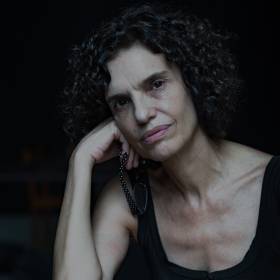
- “Rencontres augmentées” podcast by Scène Nationale du Sud-Aquitain – 2022
- “L’Heure bleue” podcast by France Inter – 2021
Bio –
Born in 1956 in São Paulo, Brazil, Lia Rodrigues studied classical ballet and history at the University of São Paulo (USP), where she took part in the city’s contemporary dance movement in the ‘70s. In 1980, she joined Maguy Marin’s company for two years. Once back in Brazil, she founded Lia Rodrigues Companhia de Danças in Rio de Janeiro in 1990, offering a year-round programme of research, creations, classes and rehearsals. In 1992 she established the Panorama festival in Rio and ran it for 14 years. Since 2004, her company has helped to develop outreach and arts actions in the Maré favela in Rio de Janeiro, in conjunction with the NGO Redes de Desenvolvimento da Maré. This partnership gave rise to the Maré arts centre, which opened in 2009; and to the Maré free dance school, open since October 2011. Combining activism and utopias, Rodrigues believes in synergy between art and social processes. In France, she created a piece based on one of La Fontaine’s fables in 2005; a series of short pieces initiated in the same decade, alongside Béatrice Masson and Dominique Hervieu; and Hymnen for the CCN Ballet de Lorraine in 2007. Her works include: Ce dont nous sommes faits (2000), Formas Breves (2002) Incarnat (2005), Chantiers poétiques (2008), Pororoca (2009), Piracema (2011), Pindorama (2013), Para que o Céu nao Caia (2016), Fúria (2018) and Encantado (2021). She has received the medal of the Knight of the Order of Arts and Letters from France; the Prince Claus Award from the Netherlands in 2014; and the Prix Chorégraphie de la SACD in France in 2016. She was named best choreographer of 2019 by Tanz magazine; and received the Prix de la Critique Danse for “choreographic personality” in 2020. Lia Rodrigues is an associate artist at the Théâtre National de Chaillot and the Centquatre-Paris.
Born in 1956 in São Paulo, Brazil, Lia Rodrigues studied classical ballet and history at the University of São Paulo (USP), where she took part in the city’s contemporary dance movement in the ‘70s. In 1980, she joined Maguy Marin’s company for two years. Once back in Brazil, she founded Lia Rodrigues Companhia de Danças in Rio de Janeiro in 1990, offering a year-round programme of research, creations, classes and rehearsals. In 1992 she established the Panorama festival in Rio and ran it for 14 years. Since 2004, her company has helped to develop outreach and arts actions in the Maré favela in Rio de Janeiro, in conjunction with the NGO Redes de Desenvolvimento da Maré. This partnership gave rise to the Maré arts centre, which opened in 2009; and to the Maré free dance school, open since October 2011. Combining activism and utopias, Rodrigues believes in synergy between art and social processes. In France, she created a piece based on one of La Fontaine’s fables in 2005; a series of short pieces initiated in the same decade, alongside Béatrice Masson and Dominique Hervieu; and Hymnen for the CCN Ballet de Lorraine in 2007. Her works include: Ce dont nous sommes faits (2000), Formas Breves (2002) Incarnat (2005), Chantiers poétiques (2008), Pororoca (2009), Piracema (2011), Pindorama (2013), Para que o Céu nao Caia (2016), Fúria (2018) and Encantado (2021). She has received the medal of the Knight of the Order of Arts and Letters from France; the Prince Claus Award from the Netherlands in 2014; and the Prix Chorégraphie de la SACD in France in 2016. She was named best choreographer of 2019 by Tanz magazine; and received the Prix de la Critique Danse for “choreographic personality” in 2020. Lia Rodrigues is an associate artist at the Théâtre National de Chaillot and the Centquatre-Paris.
Vincent Dupont
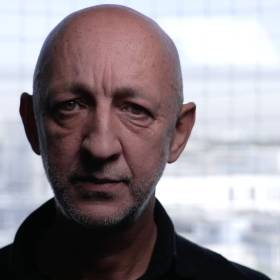
- “Entracte” video portrait by Centre des Arts d'Enghien-les-Bains – 2019\
- Extract of Air on Numéridanse – 2021
Bio –
An actor by training, Vincent Dupont had his first encounters with dance through choreographers Thierry Thieû Niang and Georges Appaix. He then took part in Boris Charmatz’s pieces Herses (une lente introduction) and Con forts fleuve. He has also collaborated on cinema projects, notably with Claire Denis.
In 2001 he composed his first dance piece: Jachères improvisations, inspired by a photo of an installation by visual artist Stan Douglas, probes reality by focusing on ideas of rapprochement and estrangement, both visual and aural. From then on, while continuing to take part in other artists’ projects, he produced work at the intersection of several media, shaking up the usual definitions of choreographic art. His creations are intended as experiences that question spectators’ perceptions. Between 2015 and 2019, Dupont was an associate artist at ICI—National Choreography Centre (CCN) in Montpellier, where he created Mettre en pièce(s) and Cinq apparitions successives. Since September 2019, he has been an associate at the Centre des Arts in Enghien-les-Bains, where he composed Attraction. In 2022, he presented Silex et craie (calcédoine et coccolithe) at the Avignon Festival.